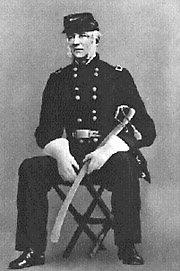
James
S. Wadsworth
of Geneseo was a leader of the Free Soil
Party
An abolitionist meeting in Rochester, called to put
pressure on moderates like Lincoln, provoked such fierce opposition that police
broke it up by turning out the gaslights.
Seward was still
the leading Republican when the 1860 convention opened at the Wigwam in Chicago.
Leading strongly on the first two ballots, he was buried on the third as delegates
swept to Lincoln.
Seward's manager, Thurlow Weed, openly cried
on the convention floor. Seated nearby in cold satisfaction was James S. Wadsworth.
Cut out of the senatorial nomination by Seward, he had helped organize the bolt
for Lincoln.
The resulting four-way election tore New York
just as it did the nation. Canandaigua Academy graduate Stephen A. Douglas shocked
America by personally campaigning for the presidency. Lincoln stuck to the traditional
“front porch” campaign.
Democratic “Little
Giant” marches in the Genesee Country crossed paths with Republican “Wide-Awakes.”
Both parties hosted torchlight parades, and Republican wigwams echoed the Whig
cabins of two decades earlier.
Republicans countered Douglas'
local connections by parading “Lincoln's sister” before Steuben County
rallies. As a girl visiting Decatur, Ill., Elizabeth Lilly had been pushed from
the path of a lurching wagon by a stranger. Seeing the young couple, both 6 feet
tall and gaunt, the town marshal observed, “a rather close call for you and
your sister.” The young man then introduced himself as “Abe Linkern.”
Republican support was strong in the Genesee Country, as it is today, but citizens
still feared what they considered extremism. An abolitionist meeting in Rochester,
called to put pressure on moderates like Lincoln, provoked such fierce opposition
that police broke it up by turning out the gaslights.
Susan
B. Anthony reconvened the meeting the next day, with a smaller crowd, in the African
Zion Methodist Episcopal Church. Two weeks later, on the other hand, a rally for
compromise turned out 10,000-20,000 working men. Lincoln swept the region, carrying
Rochester by under a thousand votes. (He would lose it to McClellan four years
later.)
Secession had already begun when Lincoln's train passed
through the Genesee Country on its way to Washington in 1861, and 15,000 frightened
Rochesterians gathered for his brief remarks on a February morning at the depot.
During the 1860 presidential campaign, Democratic 'Little
Giant' marches in the Genesee Country crossed paths with Republican 'Wide-Awakes.'
Seward
joined the new President's cabinet. Douglas held Lincoln's hat at the inaugural,
then drove himself to death with a brutal campaign to keep the border states in
the Union.
Lincoln's train crossed Monroe County again in
1865, carrying the fallen captain home to rest in Illinois. Down in the Southern
Tier, Elizabeth Lilly, who had said she wished to live as long as her “brother”
was in the White House, passed away in the very hour of his death.
With
the war's end, the Genesee Country's political pattern was set. Federalists, Whigs,
and Free Soilers had had their chance. The region was now largely Republican,
with Democratic strongholds in Rochester.
It was also far
more staid. The frontier was a distant memory, and respectability even entered
political campaigns. Rochester, with its large population, became a stop on the
circuit.

